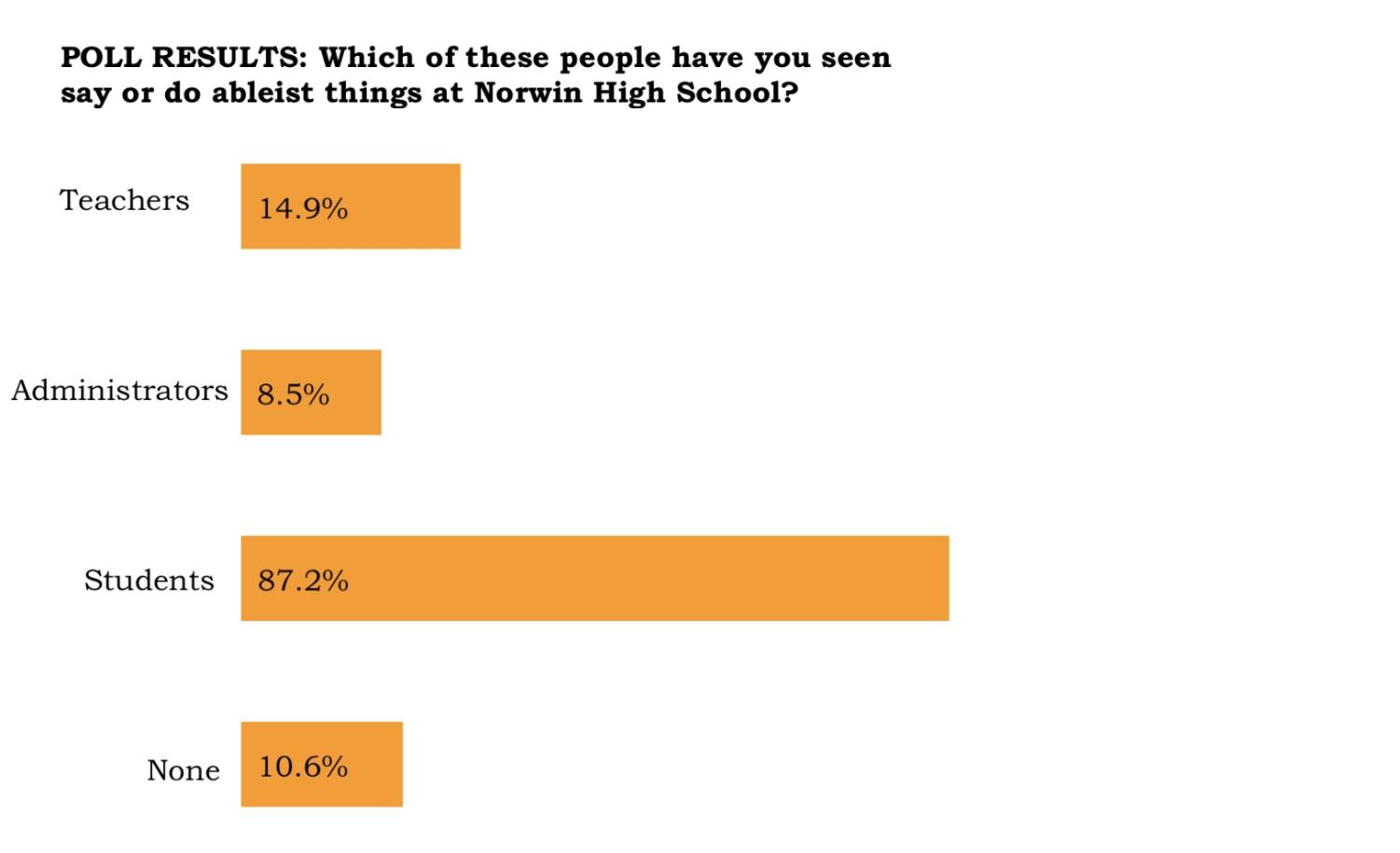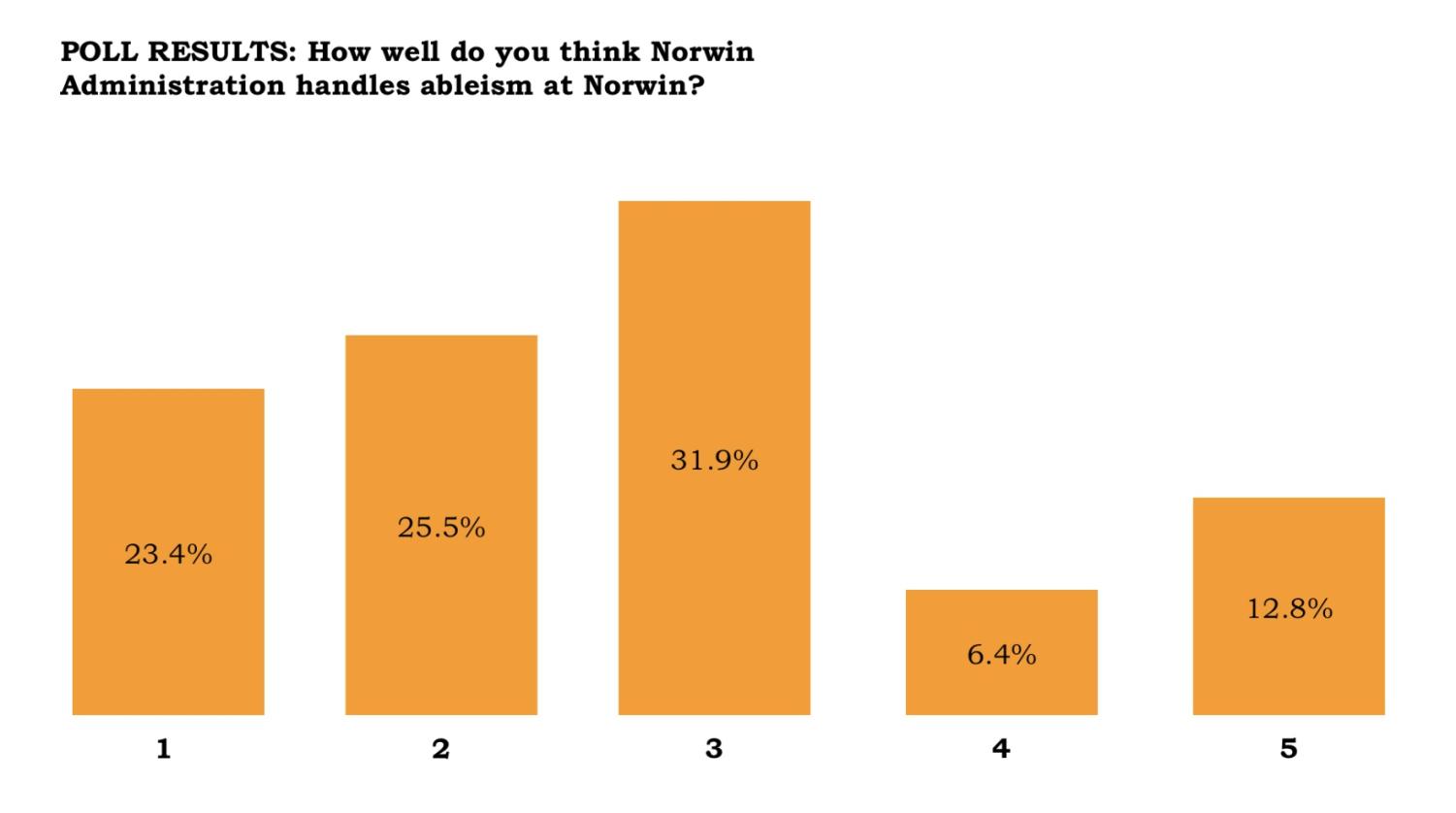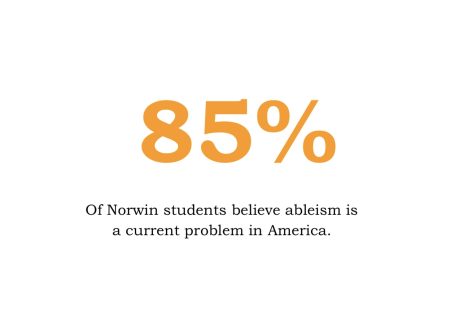Stand with students with disabilities at Norwin
April 20, 2023
Ableism is defined as “the discrimination of and social prejudice against people with disabilities based on the belief that typical abilities are superior.”
School is hard enough as is, but imagine the difficulties faced with callous discrimination stacked on top of the everyday struggles; it is an added weight that no one should have to bear.
Ableism is a problem. This isn’t an opinion, it is a fact. Walk through any high school in America, and you’re bound to hear an ableist slur or remark. No one seems to be exempt from it.
According to a study at Perkins Law, “children with disabilities are 2 to 3 times more likely to be bullied than their non-disabled peers.”
Unfortunately, ableism is all too common in a high school setting, and national statistics, though harrowing, match nearly exactly with a recent Norwin poll.
The poll, with high school student and teacher responses alike, reported that over 42% of poll takers heard derogatory language about people with disabilities in Norwin High School at least once a week.
Ableism doesn’t stop at derogatory language, however. Norwin High School poll takers reported various kinds of ableist discrimination at worrying numbers.
According to a recent Norwin poll, over 57 percent of poll takers have witnessed students with disabilities be treated differently from their peers and over 38 percent of poll takers have witnessed bullying or exclusion of students with disabilities.
Clearly, students with disabilities at Norwin are not being protected from bullying, and these experiences with discrimination are sure to have lasting effects on them.
“Yes, I do feel bullying occurs and especially the students in regular education classes without support, can be negatively affected by this,” said Special Education teacher, Mary Ann Essay. “I have seen kids become very discouraged to eat in the cafeteria, worry about being picked on on buses, and worried about speaking in classes, etc.”
However, it can be hard to speak up and fight back against ableist bullying when many students, and even some teachers at Norwin participate in the bigotry.
According to a recent Norwin poll, 87% of poll takers witnessed students say or do something ableist and nearly 15% of poll takers witnessed teachers say or do something ableist.

These statistics are extremely telling of the oftentimes disheartening environment surrounding many disabled students at Norwin.
“Seeing such harsh examples of ableism in not only the school’s students but the school’s administration makes me feel extremely hurt and upset for those who are just trying to live,” said an anonymous Norwin poll taker. “As someone with a disability that is more low-key, it’s hard to walk through the school and watch those who have different disabilities or ones that impair them more get bullied, teased, and treated like they aren’t human.”
Even when students do report ableist bullying to Norwin Administration, many students feel that little is done to address the discrimination.
In a recent Norwin poll, less than 20% of poll takers rated the Norwin Administration’s handle on ableism above a 3 out of 5.

Even further than just “stopping ableism” at a level of bullying, many students with disabilities face unsuitable, inaccessible curriculum that puts their education at risk. A lack of thought put towards the needs of all students, including those with disabilities, is a form of passive discrimination, and just like bullying, Norwin must make an active effort to stop it as well.
“When it comes to students with disabilities, I would say they should get better with students with reading disabilities. Specifically, those who can’t read print have the most trouble with the material because the school likes to use these apps that aren’t accessible with the screen reader, like Kahoot, Exact Path, and sometimes Quizlet and Study Island,” said Angelina Angelic (11), a student with a print disability. “I feel that those apps aren’t really accessible, and that can make doing work really frustrating, especially if that student with the print disability is doing work online. For me, personally, I can’t really use the mouse or the touchpad on my computer, because I can’t really see it, so when it says ‘select the text’ for an assignment, I can’t really do that.”
Though stopping ableism may seem like the bottom of Norwin’s priority list at times, there have been strides made to help students with disabilities combat discrimination in and out of the classroom.
“Bullying can be so subtle and hard to catch,” said Mary Ann Essay. “Norwin has an anti-bullying policy and should be very clear on the ramifications of these behaviors when they occur. Students with disabilities are given support through our guidance and social work departments to understand social nuances and how to better equip themselves to respond socially and if possible bullying occurs.”
Still, there is much work to be done in stopping ableism in its tracks, both in and outside of Norwin, and many students are starting to take notice of the wider impacts that bigotry has in their community and country alike.
In a recent Norwin poll, 85% of poll takers said that they believed ableism was a current problem in the United States.

Despite the bleakness of the situation, there is always hope for the future. Change is coming, and humanity is constantly growing in our compassion and improving in our outlook, but we need to put in the work.
It was put best by one of our own at Norwin:
“[Stopping ableism] will take time and effort to help others to not discriminate because we are surrounded by it everywhere we go,” said an anonymous Norwin poll taker. “We need to learn and improve on how we treat others or we will never be able to jump this hurdle of discrimination.”


